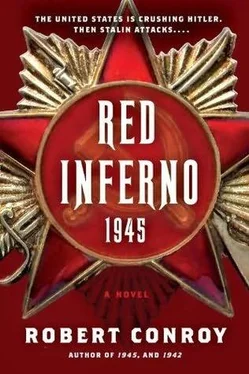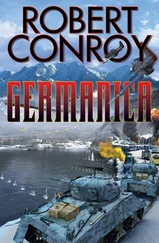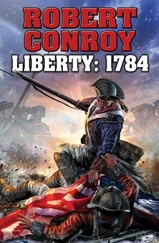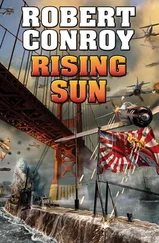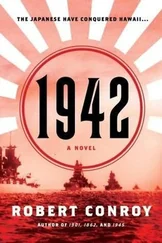Robert Conroy - Red Inferno
Здесь есть возможность читать онлайн «Robert Conroy - Red Inferno» весь текст электронной книги совершенно бесплатно (целиком полную версию без сокращений). В некоторых случаях можно слушать аудио, скачать через торрент в формате fb2 и присутствует краткое содержание. Жанр: Альтернативная история, на английском языке. Описание произведения, (предисловие) а так же отзывы посетителей доступны на портале библиотеки ЛибКат.
- Название:Red Inferno
- Автор:
- Жанр:
- Год:неизвестен
- ISBN:нет данных
- Рейтинг книги:4 / 5. Голосов: 1
-
Избранное:Добавить в избранное
- Отзывы:
-
Ваша оценка:
- 80
- 1
- 2
- 3
- 4
- 5
Red Inferno: краткое содержание, описание и аннотация
Предлагаем к чтению аннотацию, описание, краткое содержание или предисловие (зависит от того, что написал сам автор книги «Red Inferno»). Если вы не нашли необходимую информацию о книге — напишите в комментариях, мы постараемся отыскать её.
Red Inferno — читать онлайн бесплатно полную книгу (весь текст) целиком
Ниже представлен текст книги, разбитый по страницам. Система сохранения места последней прочитанной страницы, позволяет с удобством читать онлайн бесплатно книгу «Red Inferno», без необходимости каждый раз заново искать на чём Вы остановились. Поставьте закладку, и сможете в любой момент перейти на страницу, на которой закончили чтение.
Интервал:
Закладка:
Marshall grimaced slightly. “Yes, sir, he had. Why he continued on, even for a little bit, we may never know.” The general shuffled through his notes.
“The second Russian attack was a truly massive one and it hit the column approximately half of the way down its length from the point where Brentwood was attacked. It also occurred at almost the same time, which makes the Russian claim that we started it utter nonsense. I believe both attacks were planned.
“Reports are sketchy, but they indicate hundreds of Russian tanks took part along with coordinated infantry, air, and artillery support. They struck the column where it was weakest, as the greater portion of Miller’s armor and infantry strength was, logically, at the front of the column. What remained at the rear was more in the way of a rear guard, including administrative and follow-up units. In a way that was a blessing since much of Miller’s armor and artillery are still intact. Miller is attempting to establish a defensive perimeter in the city of Potsdam.”
“What about casualties?” Truman asked softly. The look in his face said that he really didn’t want to know, but had to. All the casualties would be his responsibility. He had ordered the advance beyond the Elbe. He wanted to be sick. How could this have occurred?
“Sir,” Marshall replied, “once again specifics are unknown. General Miller has reported that he has three hundred dead inside the perimeter and at least that many wounded. He has, altogether, about ten to fifteen thousand men fit and remaining in his command.”
Truman bolted from his chair. “But he had thirty thousand men!”
Marshall nodded sadly. “Yes, sir, he did. When the Red armor hit the rear third of the column it severed it and apparently rolled it up toward the Elbe. While many, perhaps most, of those men are still alive, we have to consider them missing in action and very likely to become prisoners of the Russians. There is very little chance that many will make it back to the Elbe.”
Truman’s face was pale. “Fifteen to twenty thousand casualties? I can’t believe it,” he said, sitting down slowly. Truman’s mind was in turmoil. His bold gesture to stand up to Stalin’s lies and belligerence had resulted in a catastrophe that was all his fault. There was a sign on his desk. It said “The Buck Stops Here.” God, he wished it had passed him over.
Secretary of State Stettinius again interrupted. “Consistent with his first statement, Ambassador Gromyko has stated that the American column opened fire on Russian tanks that were passing the Americans on their way to assume their rightful place on the Elbe.”
Marshall’s face flushed red. “He’s a liar. It took planning and effort to have those Soviet units in position to attack as they did.”
Truman had regained control of himself. “We know that, General. Tell me, was the battle all that one-sided?”
“Fairly so, but not totally. Our fighters did knock out some of the Russian tanks at the point of our column, and our armor and artillery acquitted themselves well, at least until they were overwhelmed. That and other fighters flying cover for the column did take on and shoot down a number of their planes without loss to our own. Altogether, we estimate that we killed about fifty of their tanks and a dozen planes, along with an unknown number of their infantry. I wouldn’t be surprised if the Russians suffered at least a thousand casualties overall.”
“War,” murmured Stettinius in disbelief. “We have another world war on our hands.”
“I sincerely hope not,” said Marshall. “We have got to end this quickly before the situation does expand into a full-scale conflict. Despite this terrible provocation, we do not want to take on Russia in a land war.” He turned to Truman. “But if it should come to that, sir, we cannot fight the Russians and the Germans at the same time. We are now involved in a two-front war, with the Nazis and Japan. If we add a third front with Russia, we will most surely lose.”
There were gasps from throughout the room. Marshall had hinted, and none too subtly, at the need for a separate peace with Germany, or even Japan, should the need arise. It was unthinkable. Or was it?
“Amen,” Truman said slowly, barely controlling his rising anger at the thought of peace with the Nazis or the damned Japs. “But we have suffered so many dead and wounded and, if you are correct, General, they have taken thousands of our boys prisoner. They will be hostages in any negotiations to resolve this. It may not be so easy to avoid a war. Which”-he sighed-“brings me to another point. What is the current status? Is there still fighting?”
There was a short pause while an aide whispered to Marshall.
“Sir,” Marshall responded, “apparently things are fairly quiet. As I said, General Miller is establishing a perimeter in and around the city of Potsdam and is digging in. With the Havel River at his back and lakes to his flanks, he is in a fairly strong position and should be able to defend himself, at least for a while. Despite fueling problems we are flying air cover over the perimeter and the Russian planes are staying away. The Russian ground forces have pulled back as well. It looks like the beginning of a waiting game.”
Which, Truman thought, is better than a shooting game. “How long can Miller’s boys stay there?”
“We are air-dropping supplies to them now. If the Reds don’t do anything rash, they could remain in Potsdam for quite some time. If they do renew the assault, it would depend entirely on the strength of the attacking forces. As it appears right now, the bulk of the Russian armies around Berlin are either closing in on Hitler’s Chancellery, where he may already be dead, or have bypassed Potsdam and are heading for the Elbe. The future will be determined by what the Russians do when they reach the Elbe.”
Truman gasped at the implication. “Are you intimating that they might not stop there? Our boys are already along that river. It would mean outright war and no way of turning back from it!”
Marshall agreed. “Ike is beginning to prepare for that contingency.”
Truman sagged. Events were so terribly out of his control. The nation was reeling from news accounts of the “incident.” Censorship was in effect, but it had proven impossible to stifle word of the battle; too many people had been involved. He would have to meet with congressional leaders to get their advice, which he didn’t want, since congressmen were always running for reelection. In his opinion, Congress was as useful as tits on a boar. As a former senator, he saw the irony of his thoughts, but a committee of several hundred could not run a war. Also, he would soon have to deal with Churchill, who had openly urged the Allies to move to Berlin.
The meeting broke up and Burke left with Marshall’s entourage. There would be a number of late nights while they tried to fathom Russia’s intentions. At best, the Russians would hold American prisoners and the soldiers in Potsdam as hostages for concessions to the Yalta agreements, which many Americans felt were already skewed in Russia’s favor.
At worst? Burke’s mind boggled at the enormity of it. At worst, another world war was about to start and with a whole new cast of characters. His return to the faculty of Notre Dame could become a distant fantasy. On campus, he was safe from the problems of the world. Now he knew there wasn’t safety anywhere. Like it or not, he had become a part of the action, and he found that he liked it. Someday he’d go back to South Bend and spend fall afternoons watching jocks try to kill each other playing football, but not for a long while.
He desperately wanted to talk with Natalie, but she had been busy at the State Department doing essentially what he was doing for War Plans and General Marshall.
Читать дальшеИнтервал:
Закладка:
Похожие книги на «Red Inferno»
Представляем Вашему вниманию похожие книги на «Red Inferno» списком для выбора. Мы отобрали схожую по названию и смыслу литературу в надежде предоставить читателям больше вариантов отыскать новые, интересные, ещё непрочитанные произведения.
Обсуждение, отзывы о книге «Red Inferno» и просто собственные мнения читателей. Оставьте ваши комментарии, напишите, что Вы думаете о произведении, его смысле или главных героях. Укажите что конкретно понравилось, а что нет, и почему Вы так считаете.
